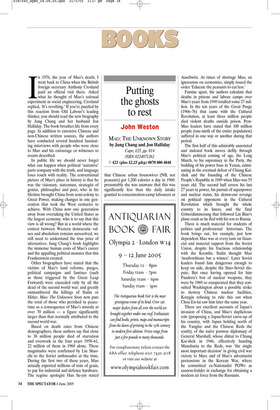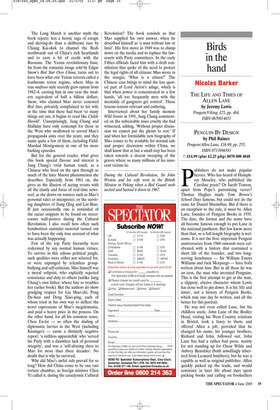Putting the ghosts to rest
John Weston
MAO: THE UNKNOWN STORY by Jung Chang and Jon Halliday Cape, £25, pp. 814
ISBN 0224071262
✆ £23 (plus £2.25 p&p) 0870 800 4848 In 1976, the year of Mao’s death, I went back to China when the British foreign secretary Anthony Crosland paid an official visit there. Asked what he thought of Mao’s colossal experiment in social engineering, Crosland replied, ‘It’s revolting.’ If you’re puzzled by this reaction from Old Labour’s leading thinker, you should read the new biography by Jung Chang and her husband Jon Halliday. The book breathes life from every page. In addition to extensive Chinese and non-Chinese written sources, the authors have conducted several hundred fascinating interviews with people who were close to Mao and his entourage or witnesses to events described.
In public life we should never forget what can happen when political ‘narrative’ parts company with the truth, and language loses touch with reality. The conventional picture of Mao’s place in history is that he was the visionary, statesman, strategist of genius, philosopher and poet, who in his lifetime brought China from semi-colony to Great Power, making changes in one generation that took the West centuries to achieve. With China now one generation away from overtaking the United States as the largest economy, who is to say that this view is all wrong? But in a world where the contest between Western democratic values and absolutism remains unresolved, we still need to understand the true price of alternatives. Jung Chang’s book highlights the immense human costs of Mao’s career and the appalling political monster that this Frankenstein created.
Other biographers have stated that the victims of Mao’s land reforms, purges, political campaigns and famines (such as those triggered by the Great Leap Forward) were exceeded only by all the dead of the second world war; and greatly outnumbered the killings of Stalin or Hitler. Mao: The Unknown Story now puts the total of those who perished in peacetime as a consequence of Mao’s misrule at over 70 million — a figure significantly larger than that normally attributed to the second world war.
Based on death rates from Chinese demographers, these authors say that close to 38 million people died of starvation and overwork in the four years 1958–61, 22 million of them in 1960 alone. These magnitudes were confirmed by Liu Shaochi to the Soviet ambassador at the time. During the first two of these years, Mao actually exported millions of tons of grain, to pay for industrial and defence hardware. The regime apologist Han Su-yin stated that Chinese urban housewives (NB, not peasants) got 1,200 calories a day in 1960: presumably she was unaware that this was significantly less than the daily intake granted to concentration-camp labourers at Auschwitz. At times of shortage Mao, an ignoramus on economics, simply issued the order ‘Educate the peasants to eat less.’ Famine apart, the authors calculate that deaths in prisons and labour camps over Mao’s years from 1949 totalled some 27 million. In the ten years of the Great Purge (1966–76) that came with the Cultural Revolution, at least three million people died violent deaths outside prison. PostMao leaders have stated that 100 million people (one-ninth of the entire population) suffered in one way or another during that period.
The first half of this admirably annotated and indexed book moves deftly through Mao’s political coming of age, the Long March, to his supremacy in the Party, the building of his power base in Yenan, culminating in the eventual defeat of Chiang Kaishek and the founding of the Chinese People’s Republic in 1949 when Mao was 55 years old. The second half covers his last 27 years in power, his pursuit of superpower and nuclear status, his drawn-out revenge on political opponents in the Cultural Revolution which brought the whole country to its knees, and the final Götterdämmerung that followed Lin Biao’s plane crash as he fled with his son to Russia.
There is much material for students of politics and professional historians. The book brings out, for example, just how dependent Mao was at every turn on financial and material support from the Soviet Union, despite his fractious relationship with the Kremlin. Stalin thought Mao ‘insubordinate but a winner’. Later Soviet leaders found him dangerous enough to keep on side, despite the Sino–Soviet dispute. But once having opened for him Pandora’s box of nuclear weapons, they were by 1969 so exasperated that they consulted Washington about a possible strike to destroy Chinese nuclear facilities, Kosygin refusing to rule this out when Chou En-lai saw him later the same year.
There are excellent accounts of Japan’s invasion of China, and Mao’s duplicitous role (proposing a Japan/Soviet carve-up of his country, with Japan holding north of the Yangtze and the Chinese Reds the south); of the naïve postwar diplomacy of General Marshall, whose diktat to Chiang Kai-shek in 1946, effectively handing Manchuria to the Reds, was ‘the single most important decision’ in giving civil war victory to Mao; and of Mao’s adventurist pretensions in the Korean War, where he committed ex-Nationalist POWs as cannon-fodder in exchange for obtaining a modern air force from the Russians. The Long March is another myth the book rejects: less a heroic saga of escape and derring-do than a deliberate ruse by Chiang Kai-shek to channel the Reds northwards out of China’s rich heartlands and to earn a bit of credit with the Russians. The Yenan revolutionary base, far from the romantic image sold by Edgar Snow’s Red Star Over China, turns out to have been what one Yenan veteran called a loathsome terror regime, where Mao in true mafioso style secretly grew opium from 1942–4, earning him in one year the modern equivalent of half a billion dollars. Snow, who claimed Mao never censored Red Star, privately complained to his wife at the time that there had been ‘so many things cut out, it begins to read like Childe Harold’. Unsurprisingly, Jung Chang and Halliday have only contempt for those in the West who swallowed or served Mao’s propaganda aims over the years, and they name quite a few of them, including FieldMarshal Montgomery in one of his more barking episodes.
But for the general reader, what gives this book special flavour and interest is Jung Chang’s vivid human touch, as a Chinese who lived on the spot through so much of the later Maoist phenomenon she describes. Especially from 1961 on, she gives us the illusion of seeing events with all the clarity and focus of real-time newsreel, as she draws on sources such as Mao’s personal valet or interpreter, or the surviving daughters of Jiang Qing and Lin Biao. If just occasionally one is reminded of the racier snippets to be found on streetcorner wall-posters during the Cultural Revolution, I also recall how often such handwritten samizdat material turned out to have been the only true account of what was actually happening.
Few of the top Party hierarchy were redeemed by any normal human virtues. To survive in this odious political jungle, such qualities were either not selected for, or were expunged by relentless groupbullying and self-criticism. Mao himself was a moral solipsist, who explicitly rejected conscience and duty to others (unlike Jung Chang’s own father, whose fate so troubles her earlier book). But the authors do show grudging respect for Liu Shao-chi, Peng De-huai and Deng Xiao-ping, each of whom tried in his own way to deflect the worst expressions of Mao’s megalomania, and paid a heavy price in the process. On the other hand, for all his common sense, Chou En-lai — so often the darling of diplomatic luvvies in the West (including Kissinger) — earns a distinctly negative report: ‘a ruthless apparatchik’ who ‘served his Party with a dauntless lack of personal integrity’, and was a ‘self-abasing slave to Mao for more than three decades’. No doubt that is why he survived.
Why did Mao’s awful rule prevail for so long? How did China come to be one vast torture chamber, as foreign minister Chen Yi called it, during the cataclysmic Cultural Revolution? The book reminds us that Mao supplied his own answer, when he described himself as ‘a man without law or limit’. His first move in 1949 was to clamp down on the media and to replace the lawcourts with Party committees. In the early Fifties officials faced him with a draft constitution that spoke of the need to protect the legal rights of all citizens: Mao wrote in the margin, ‘What is a citizen?’ The Chinese case brings to mind the less quoted part of Lord Acton’s adage, which is that when power is concentrated in a few hands, ‘all too frequently men with the mentality of gangsters get control’. These lessons remain relevant and enduring.
Interviewed about her family memoir Wild Swans in 1991, Jung Chang commented on the unbearable mass cruelty she had witnessed, adding, ‘Without proper discussion we cannot put the ghosts to rest.’ If and when her formidable new biography of Mao comes to be available for normal sale and proper discussion within China, we shall know that at last a small step has been taken towards a decent sweeping of the graves where so many millions of his innocent victims lie.
During the Cultural Revolution, Sir John Weston and his wife were in the British Mission in Peking when a Red Guard mob sacked and burned it down in 1967.



















































 Previous page
Previous page